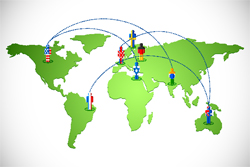The EU, a multilateral player
That the world is evolving into a global village is becoming more relevant with each passing decade. More and more, countries are working together to combat global issues. With increased research, we understand that certain concerns know no national boundaries, and with increased international trade, countries are increasingly more reliant on other nations for goods and services. As a result, demand for a multilateral approach is increasing as new international challenges arise. Multilateralism is defined in many ways, but common to all are inclusiveness, institutionalised cooperation and the importance of rules. The EU itself has recognised the importance of multilateralism as evidenced in the 2003 European Security Strategy and Lisbon Treaty. The EU-funded 'Multilateralism and the EU in the contemporary global order' (Mercury) project was set up to critically examine the EU's contribution to multilateralism; it explores multilateralism as a concept, an aspiration, and a form of international order. The sheer breadth of the concept demands an interdisciplinary approach and the project is drawing on expertise in law, politics, economics, and international relations. It is also making a point of not only exploring multilateralism's intellectual aspects and evaluating its different methods, but also of providing practical policy guidelines considered to be relevant. To this effect, Mercury is aiming to develop 'best practice' criteria to guide choices about how multilateralism should be pursued as a strategic goal of EU external policy. The team is also investigating how resources may be best combined in the pursuit of effective multilateralism. In line with the concept of multilateralism, the project is involving countries from around the world including China and South Africa. This inclusiveness contributes to the project's goal of building a European Research Area (ERA) with strong international links through engagement with participant institutions in International Cooperation Partner Countries (ICPCs) Mercury is also aiming to improve capacity-building by contributing to the establishment and consolidation of a sustainable international research network. This promises an academic and political impact beyond the life of the project.







